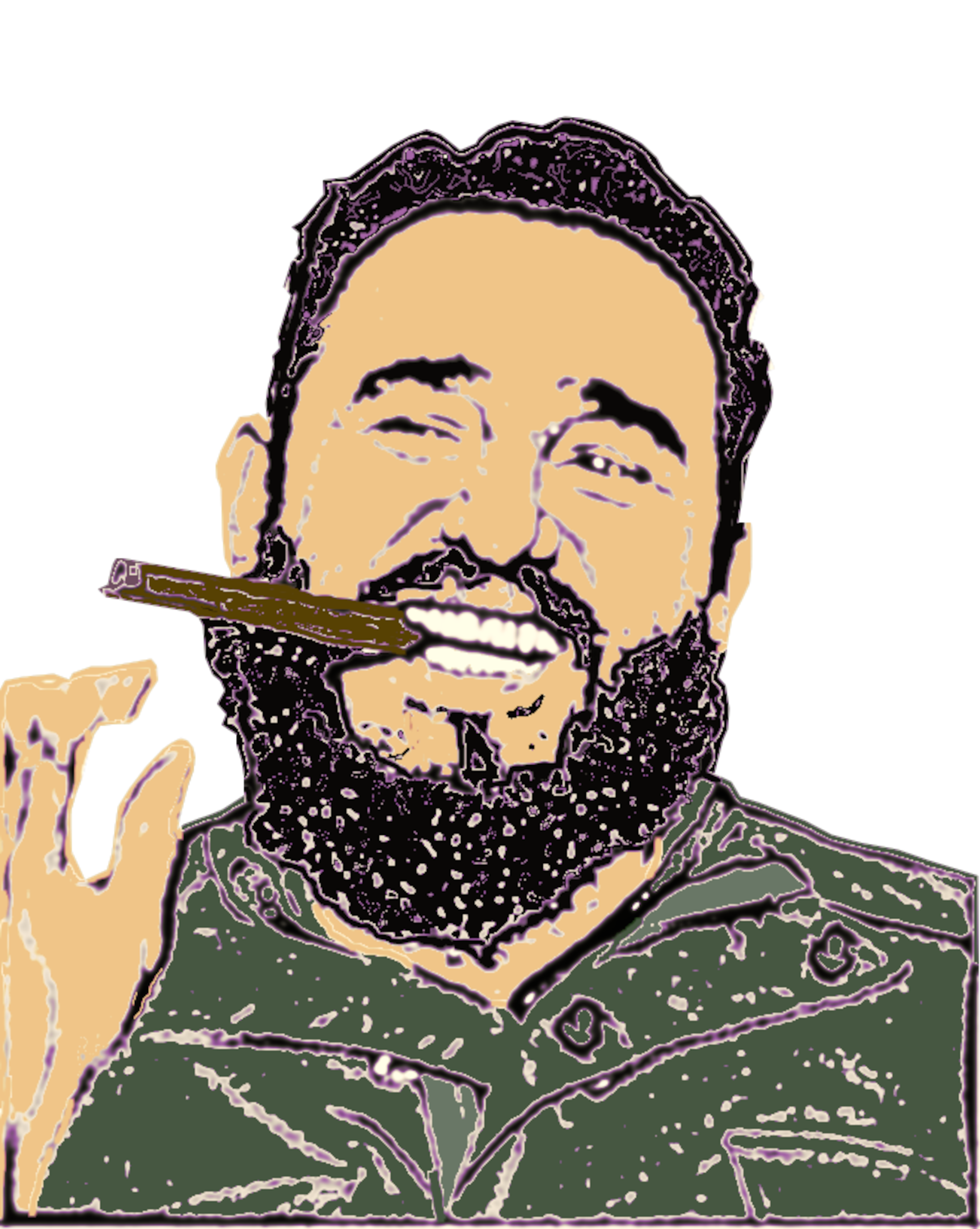What does it mean for workers to collectively own means of production? Am I supposed to own only the laboratory I work at or everything everywhere? What if I decide to change a place of employment? Why doesn't owning it though the intermediary of the state and your representative in the communist party qualify?
this line mostly comes from people who aren't willing to recognize the successes of actual communist (or communist-striving if you want to be pedantic) societies. by strict definition, no, China, the USSR, etc weren't communist. but they were states that acted in the interests of workers over the capitalists, and vastly improved the living standards of the average person.
They were / are states ruled by communist parties, who do what they can to steer things toward communism. The fact that there isn't a magic communism button they can push overnight doesn't mean they're lying about their ideology or something.
Lots of people think you just have a revolution, and then you just kind of "have communism" once you've done the revolution part.
yeah so what you want to do is immediately after a revolution which destabalised everything have everyone settle down into a perfect society with no pushback, or logistical and/or organisational issues.
Also all the supporters of the old regime should be armed and free to organise themselves as they will
read in the voice of a condescending 14 year old
There's almost certainly going to be massive brain drain as engineers, doctors, and other highly technical fields completely staffed with labor aristocrats and the petit bourgeoisie flee your socialist paradise because of material interests and false class consciousness. Pretty much no leftist ideology have thought this far.
Lots of people think you just have a revolution
This too is it's own problem tbh. :thonk:
Well you do. It’s just that the revolution lasts decades not days
I guess this is where the line between socialism and communism comes. USSR claimed they were going to build communism (classless moneyless society, etc.) at some future point. As far as I understand the party considered late USSR to be a socialist country, not just a capitalist country run by a communist party.
One of the major ideological splits between the CPC (Communist Party of China) and RCP (Russian Communist Party) was that the RCP considered their country 'ready for socialism' while the CPC considered themselves 'in the accumulation stage, moving towards early stage socialism'. The irony of course was that both ended up moving towards deregulation in order to accomplish those ideological goals, but the CPC managed to hold onto the organs of military and state through the politburo, which was a demonstratively better idea, which Russia has, adopted again (though without as many democratic organs as the CPC or the now politically defunct RCP) in order to curb the influence of the international bourgeois.
The political makeup continues to be in flux, but going towards a more nationalistic populism, the only force that, atm, can compete with the interests of international capital. This is fine atm, as allowing unchecked exploitation and empire only increases human misery, but the end goal must be an organization of the international proletariat. But we are a loooooooong way away from that. In that line, expecting existing Communist parties to forsake the general welfare of their people in order to pursue permanent revolution' is foolhardy at best. I think the time of the periphery is coming, sooner than people realize, but it will take a much different form that the communist revolutions of the 1910's. My only wish is it to be dialectical, both less hopeful, and hopefully, more successful.
Marx explicitly said that the early stages of the Dictatorship of the Proletariat will appear very much like a State Capitalist system and that the transition would be gradual, by degree. That the communist party would “wrest by degree” capital away from the hands of the bourgeoise.
Yet you have these modern “Marxists” who think that anything short of global instant communism isn’t a movement towards communism
I need to read more Lenin, but is this the infantile disorder he was talking about?
Yes it is Left Communism, the Marxists you meet who don’t believe there has ever been a single real socialist project. Some of them believe the Bolshevik revolution was legitimate but then corrupted (the more Trotskyist strains) while others believe even that was a bourgeois revolution and that there has never once been a real proletariat revolution.
If I honestly believed what these Left Communists believed, that a century of socialist struggle was all fake and there hasn’t even been a whimper of “real communism” after hundreds of attempts, I would simply stop being a communist because clearly it’s not possible
Yes and no, on the one hand, these guys are the direct descendent of the Left-Councilists Lenin critiques (or, more correctly the Bordigaists that are often confused with them.) On the other hand the Councilists were unequivocally in critical support of the October Revolution, and even Bordiga wouldn't go as far as this guy.
As I've mentioned here before, The USSR didn't claim to have achieved Socialism, even in the lowest stage, until the 70s (and that's widely been seen as premature). China has a Socialist government forming a DotP, but does not claim to have built a Socialist society yet.
I think the DPRK does claim it, but the DPRK has gone far enough from standard Marxist forms that I'm not sure the standard theoretical framework works as well anymore (Critical support to the DPRK of course).
Marx himself would disagree this with meme.
The idea of workers owning the means of production as socialism is an extremely workerist view of socialism. The flaw of this conception can be illustrated with this one simple question: what happens to the people of a society who, through no fault of their own, cannot work? What happens to people who are too young to work, people who are too old to work, and people who are too disabled to work? Do they get a say in how society runs? If they do, then they too must also own the means of production, but if they do, then it's no longer just workers who own the means of production but the masses of people within that society.
In the Critique of the Gotha Programme, Marx goes over this point, stating that:
To understand what is implied in this connection by the phrase "fair distribution", we must take the first paragraph and this one together. The latter presupposes a society wherein the instruments of labor are common property and the total labor is cooperatively regulated, and from the first paragraph we learn that "the proceeds of labor belong undiminished with equal right to all members of society." "To all members of society"? To those who do not work as well? What remains then of the "undiminished" proceeds of labor? Only to those members of society who work? What remains then of the "equal right" of all members of society?
Likewise, the idea of workers being fully entitled to the fruits of their labor is also workerist. Unless you think 8 year olds and 80 year olds have to work as well, someone has to work for their sake. The food an 8 year old eats and the clothes an 80 year old wears can only exist through someone else's labor, but since they themselves cannot work, the food and clothes exist as surplus product of someone else's labor.
Once again from Critique of the Gotha Programme:
These deductions from the "undiminished" proceeds of labor are an economic necessity, and their magnitude is to be determined according to available means and forces, and partly by computation of probabilities, but they are in no way calculable by equity.
There remains the other part of the total product, intended to serve as means of consumption.
Before this is divided among the individuals, there has to be deducted again, from it:
First, the general costs of administration not belonging to production. This part will, from the outset, be very considerably restricted in comparison with present-day society, and it diminishes in proportion as the new society develops.
Second, that which is intended for the common satisfaction of needs, such as schools, health services, etc. From the outset, this part grows considerably in comparison with present-day society, and it grows in proportion as the new society develops.
Third, funds for those unable to work, etc., in short, for what is included under so-called official poor relief today.
Only now do we come to the "distribution" which the program, under Lassallean influence, alone has in view in its narrow fashion – namely, to that part of the means of consumption which is divided among the individual producers of the cooperative society.
The "undiminished" proceeds of labor have already unnoticeably become converted into the "diminished" proceeds, although what the producer is deprived of in his capacity as a private individual benefits him directly or indirectly in his capacity as a member of society.
The idea of society as a whole owning the means of production and not just workers has other ramifications. If we just narrowly organize society around workers owning the means of production, you can then make the argument that a factory owned by a worker co-op should be run exclusively by that worker co-op since from the perspective of the factory, only the workers of the co-op are workers and everyone else is a nonworker. This means if every single worker votes to pollute a river with industrial waste, this would apparently be socialism in action regardless of what happens to other people who use the river.
But the factory doesn't exist in a vacuum, but within a society comprised of both workers and nonworkers. If we understand socialism as the masses of people owning the means of production, then society at large decides how the factory is run, not just a narrow slice of society tasked with running the factory. The factory workers are not being oppressed for being forbidden to dump industrial waste into the river. They might want to, but the rest of society do not, so why should their voices be more important than the rest of society?
Yeah, this. Sure, if we could press the big red "Gotha Program" button, we would. But that would go only half way to building Socialism.
I get that this specific picture is a stupid meme, but I see people people going "actually the workers didn't actually own means of production" all the time.
Ask them to explain what "the workers own the means of production" means to them. Then follow up with the questions you asked in your post, basic stuff like:
Am I supposed to own only the laboratory I work at or everything everywhere?
If they can't come up with a decent answer,
you've owned thempoint out this is a complex question to conceptually answer, let alone put in practice. Ask them if taking substantial steps toward whatever the answer might be is worth supporting now, because they and no one else have anything demonstrably better.If they are at least committed to one possible answer (maybe some combination of full employment + you directly own your immediate workplace with your colleagues, and every higher-level economic organization is governed democratically?), well, now you're having a more grounded conversation. You can match up examples with what they say they want, rather than just arguing in a vacuum.
I've had this argument before and the textbook flat answer is "everything becomes a co-op lol"
Then, of course, without changing the methods of accumulation all you have really changed is that instead of someone else exploiting you, you are exploiting yourself (from a labor value estimation).
Certainly a better option, but no less prone to cycles of accumulation and lay-off.
How does everything become a co-op without establishing some form of worker's state to keep that process happening through the transitionary stage? I feel like this whole debate just goes around and around in big, dumb interminable circles.
It does. This is because the problem is one of 'political economy', a subject that only Marxists and their ideological descendents (namely modern day academic sociologists and anthropologists who nobody reads) talk about. Political and economic structures intertwine and influence each other to such a degree that separating them into distinct categories is rationalizing at best, obfuscating at worst.
The point is ultimately to organize the international proletariat to such a degree that it becomes possible to destroy the value-form (i.e. money), a.k.a the very fetishization of commodity. One of the reasons you do this is because money, though useful in low information systems for liquid exchange, actually acts as a labor-value obfuscation system in high information systems. A very easy modern day example is how the stock market increases in 'value' despite having no relationship to actual product increases (labor-value). This obfuscation creates inherent inefficiency, and creates perverse incentives for economic and political behavior ( hence the many jokes on here about 'line go up'). Transitioning to co-ops doesn't inherently affect the value form, hence it cannot be the end goal of socialism/communism. It is still too alienated. Ironically, Walmart is closer to abolishing value-form than a series of small trading co-ops, it's just that it's interactions with larger society are more largely parasitic and capitalistic in nature than a series of co-ops.
This is part of the reason communism, imo, is so difficult for people in the West to understand, because what we understand to be more 'human' and 'societal' are organizations that harken backwards towards settler-colonial business ventures, rather than taking over and humanizing developments of capitalist industry towards societal goals. You know, 'seizing the means of production'.
a real ultra's ultra just says 'like in revolutionary catalonia' and goes back to huffing their own farts
I would agree, but it doesn't mean that I condemn the entirety of the USSR and what it attempted to acheive.
I feel like the focus on the economic features of socialism obscure how socialism would manifest through political process and the question of "who owns the state" - if Cuban citizens can vote on their constitution and Chinese voters can recall their elected officials, then that's more ownership of the state than many Western democracies can lay claim to.
half the time they mean co-ops competing in the market place (i.e. capitalism where workers exploit themselves). the other half of the time they mean 'the final project must be completed immediately'
Sigh
Marx addresses this in his Conspectus of Bakunin's State and Anarchy, which reads like a passive aggressive forum post where one person quotes another and responds.
https://www.marxists.org/archive/marx/works/1874/04/bakunin-notes.htm
Bakunin This dilemma is simply solved in the Marxists' theory. By people's government they understand (i.e. Bakunin) the government of the people by means of a small number of leaders, chosen (elected) by the people.
Marx: Asine! This is democratic twaddle, political drivel. Election is a political form present in the smallest Russian commune and artel. The character of the election does not depend on this name, but on the economic foundation, the economic situation of the voters, and as soon as the functions have ceased to be political ones, there exists 1) no government function, 2) the distribution of the general functions has become a business matter, that gives no one domination, 3) election has nothing of its present political character.
Bakunin: The universal suffrage of the whole people...
Marx: Such a thing as the whole people in today's sense is a chimera --
Bakunin: ... in the election of people's representatives and rulers of the state -- that is the last word of the Marxists, as also of the democratic school -- [is] a lie, behind which is concealed the despotism of the governing minority, and only the more dangerously in so far as it appears as expression of the so-called people's will.
Marx: With collective ownership the so-called people's will vanishes, to make way for the real will of the cooperative.
Anyway the point is that politics currently are a matter of voting for political ideology driven by economic class. The political parties are formed as representatives of class groups that are formed by the economic base of the nation. When you change the economic base to eliminate class then you also eliminate the formation of political parties based on class groups because they literally do not exist.
This creates a scenario where policy is determined by the true will of the collective and not by economic motives.
However this assumes that you don't have wrecker groups taking part to achieve counter-revolution. Which you most certainly will have until capitalism is eliminated worldwide.
God damn, beginning a paragraph with "Asinine!" is such an incredible chad move :marx-chad:
Death to America
Like others have said its technically true that China and the USSR haven't achieved full socialism, but its a dumb way to look at it. The real measure should be if they have a dictatorship of the proletariat. Its such an important distinction that people who come up with these "China isn't socislist" takes are clearly ignorant of, or just do the Western lefitist AES bad shit
I'm asking this in good faith so please don't roast me too hard, but what excatly makes China a dictatorship of the proletariat? As far as I understand the Chinese political system (which isn't very far) it's ultimately an electoral system, and though I'm sure it's more democratic than :amerikkka: I struggle to see how that could be truly representative in a society that hasn't yet eliminated class and private ownership.
Because the state and commanding heights of the economy are controlled by the Communist Party, which is the democratic centralized organization of the advanced proletariat. As soon as Mao and the communist party seized control of China’s means of production and state it became a Dictatorship of the Proletariat.
You can see the proof in the fruits of their actions if you are still skeptical. The outcomes of their policies benefit the whole of society and especially the poor, pulling over a billion people out of poverty and backward peasantry. There’s a reason why China’s policies and outcome trends are the exact opposite of the West, and it’s because the government is composed of proletariat who serve the interests of proletariat and the nation as a whole. No bourgeois state operates in this manner.
China: Builds thousands of miles of public transport, spends trillions of dollars on economic development and poverty elimination, poverty decreasing, executes bourgeois who try to get out from under the thumb of the state, most green energy infrastructure on Earth, not reliant on Imperialism and colonialism to develop itself….
Bourgeois states: Transport is non-existent or decaying, spends very little on poverty elimination and instead rely on violent suppression and policing, poverty increasing or stagnant, bourgeoise act with legal impunity above the state, very little green infrastructure, reliant on Imperialism or colonialism, etc..
There’s a reason these are all diametrically opposed
Perfect answer here, better than i could have done lol :fidel-salute:
Because the state and commanding heights of the economy are controlled by the Communist Party, which is the democratic centralized organization of the advanced proletariat.
So I guess this is really what I don't understand. China is absolutely one of the most competent states in the world, and as you said their policies have led to enormously improved quality of life. But if a bourgeois state like the US suddenly started investing in social welfare it would obviously still be capitalist and undemocratic. What mechanisms for democratic governance does China have that other states lack that ensure the state and party are subservient to the people, despite the contradictions of capitalism still existing?
But if a bourgeois state like the US suddenly started investing in social welfare…
The US cannot start investing in social welfare because it is dominated by the bourgeoise who don’t prioritize that. If they had to made some concessions to society to stabilize it, it would be social imperialism because it is funded by American imperialist extraction of other nations. China is not imperialist, they don’t rely on foreign extraction and have managed to develop and industrialize peacefully - something no bourgeois state has ever accomplished.
No bourgeois state has ever enacted social welfare without imperialism. Capitalism requires an exploited class, if it isn’t domestic then it will be abroad (usually it’s both).
their policies have lead to enormously improved quality of life
Can you find a single example of a bourgeois state that industrialized and made enormous improvements in quality of life without imperialism? China did it, no bourgeois state has ever done so. They either become part of the imperialist bloc and industrialize through blood and theft, or they wallow in poverty.
This is a super good point, I'm in the imperial core and I still forget a lot how much I benefit from colonial exploitation.
As for what democratic mechanisms exist, the PRC has a similar government, constitution and election system as DPRK and Cuba, with guiderails to ensure that no reaction ever takes hold, and Capital doesn’t purchase influence (Xi has an entire book talking about his anti-corruption policies to purge the influence of Capital from the state).
The proof is in the pudding, again all you need to look at is the 95% approval rating of the party and the unity of the nation behind them - the near unanimous support for most policies, and the responsiveness of the government to adapt when it does not match up with public opinion
I guess I need to actually read up on the political and electoral system, it's a little much to ask you to explain those to me. I guess you're right that if the people support the state (which they certainly seem to) then it by definition represents the will of the people. If anything at this point I'm just curious how they manage to be so responsive despite governing over a billion people. Thanks for taking the time to reply to me!
A_Serbian_Milf gave a great answer for you. Just wanted to say no roasting necassary for asking in good faith. We all have to learn, and theres so much disinfo as regards China and all AES. I sure had to learn and deprogram. :sankara-salute:
Worker ownership of the means of production is insufficient. Capitalistic competition between syndicates will lead to largely the same outcomes on the societal level as competition between individual capitalists. There needs to be higher level social cooperation. Also :bait:
Yes at the end of the day it’s the system of profit seeking and capital accumulation that is the root problem. Even if you abolish the bourgeois class that owns the capital, if shared capital accumulation is still the engine of your economy then you will still have to deal with the contradictions of capitalism.
Individual firms cannot create socialism on their own, they will still have to follow profit incentives unless there is an overlying planned economic system forcing them to follow social ends instead of profit-based ends
This is why co-ops will never lead to socialism on their own, nor will small scale communes.
The person who made the meme is a utopian who doesn't understand basic theory. The "dictatorship of the proletariat" definitionally has proles, and therefore also has bourgeoisie. If you need a longer explanation I can give you one that I wrote a week ago for a general-ish audience.
sure I'd be interested in hearing an explanation it's always good to hear a good breakdown of theory, helps you keep from developing weird misunderstandings
On the DotP
How, according to Marx and Engels, does scientific socialism advocate for revolution without being utopian?
While the state machinery itself must be smashed and replaced, much of society in a young socialist state would be expected to resemble that of a liberal capitalist state (though that depends on how advanced the state was prior to the revolution, as well as its specific current challenges).
Many people look at, for example, contemporary Vietnam and say "how can this be socialist when capitalists remain infesting society?" They might even say that such a presence precludes it from being a "dictatorship of the proletariat".
Saying this, they fail to even consider how a government could be characterized as lead by the proletariat.
"Proletariat" does not simply mean "worker" or we would just use that word in all cases. The proletariat is a historically specific class that has not always existed and will not always exist. It is defined in opposition to the bourgeoisie, without whom it would not exist. Specifically, the proletarian is one who subsists by selling their labor (typically on a wage basis) to the private property owners (the bourgeoisie). The presence of the bourgeoisie is not only possible in but is in fact necessary for a dictatorship of the proletariat.
"But are we only talking about nomenclature? What about material reality and revolutionary strategy? What separates this from pseudo-semiotic bullshit?"
This is where utopianism comes back in. Building an entirely new economic model from scratch simply isn't viable on any level. The purpose of the dictatorship of the proletariat is to use markets to the advantage of the socialist project.
In all previous modes of government, the owning class has also controlled the state. This has the result of perpetuating class struggle, because the owning class is dependent on the labor value produced by the working class, and so must keep it in existence (as well as keep itself in existence).
The working class does not share perfectly symmetrical class antagonisms, because it is a very different class. Pertinently, it is not instrinsically dependent on the bourgeoisie's indefinite existence. Yes, from a vapid semiotic perspective there is no proletariat without a bourgeoisie, but the actual members of the proletariat as the dominated class do not have it in their material interest to be dominated indefinitely. Should a circumstance emerge where, due to technological innovation, it becomes more efficient for society overall to nationalize an industry, the proletariat will not hesitate to do so whereas the bourgeoisie certainly have.
Here's Marx and Engels discussing it in the Manifesto:
We have seen above, that the first step in the revolution by the working class is to raise the proletariat to the position of ruling class to win the battle of democracy. The proletariat will use its political supremacy to wrest, by degree, all capital from the bourgeoisie, to centralise all instruments of production in the hands of the State, i.e., of the proletariat organised as the ruling class; and to increase the total productive forces as rapidly as possible. Of course, in the beginning, this cannot be effected except by means of despotic inroads on the rights of property, and on the conditions of bourgeois production; by means of measures, therefore, which appear economically insufficient and untenable, but which, in the course of the movement, outstrip themselves, necessitate further inroads upon the old social order, and are unavoidable as a means of entirely revolutionising the mode of production.
In this way, under the DotP, the bourgeoisie are gradually nationalized out of existence as the country develops. This is the process Marxists refer to as the "withering away of the state". The predicted end result of this is a classless society, but that is in the distant future.
So the purpose of a revolution is, from a certain perspective, to enable a "withering away of the state" which is prevented when the bourgeoisie control the state.
In this way, under the DotP, the bourgeoisie are gradually nationalized out of existence as the country develops. This is the process Marxists refer to as the “withering away of the state”.
It sounds like the exact opposite. Nationalizing production sounds like the building up of the state. What am I missing?
Good question!
The "state," as defined in Marxism, is the "mediator of class antagonisms". With no class, there is no state (and thus we would say primitive communism was also roughly stateless) even if there is still a "government". Without class antagonisms driving political conflict, the government is predicted to become essentially a managerial apparatus.
You are right though that if we speak in liberal parlance, building up the public sector until there is no private sector would be considered growing the state, as it is certainly expanding what falls under the control of the government -- which in turn is controlled by the people through democratic means without interference from an owning class that is distinct from the rest of the population.
It's like how "state" and "nation" are also taken as synonyms most of the time but have somewhat different meanings even in liberal parlance, as evidenced by the need for the term "nation-state". "Nation" is more of a cultural descriptor, in its more technical sense, which is also why fascists love to use that specific term so much.
Thank you. Are there any primary sources you can refer to explore this topic more?
The main thing I'm going off of there is State and Revolution, along with Socialism: Utopian and Scientific to a lesser degree.
Yes, communism eventually will not be run by proletariat. It will be run by the interests of the whole of society. If communism has been achieved then classlessness has been achieved.
If the proletariat have to wield an instrument of state power to smash their class enemies then it’s still in the transitional stage of the DotP
this anti-USSR shit is such fucking gymnastic pedantic argument. if a state cannot be an organisation to enforce people's ownership, what can? a soviet that controls each individual factory? a soviet bigger than that doing logistics and civics is clearly too state-like right? how about every individual worker just owns a fucking share of their worksplace then? lil financialised market socialism to satisfy the radlibs
if workers use industry for social good it must be in a coordinated planned economy. call it whatever you fucking want a 'state' a 'council' a 'syndicate' but you're going to end up with degrees of separation between decision making and work, and pretending these degrees of separation invalidate "worker ownership" the entire project is DOA.
and beyond this the USSR actually had more mechanisms of worker control than a simple DoP, but the people who say shit like this don't actually know how the soviet economy or political system worked
I'll be honest, all the shit about real socialism / not real socialism mostly just highlights to me that I don't really give a shit, but that I simply support whichever projects make life suck less for the poor and the working class more broadly.
Same, same. As long as everybody gets everything they need and there's a basic level of equality and democratic control, I don't particularly care if having money or the state makes it not "real communism". I'm sure considering the position we're in right now we can worry about those things later.
It's great that we can agree on this important issue of harm reduction. I hope that we can continue this collaboration in the future. :biden-leftist:
just say that it's racist and colonial to dismiss socialists of color and let their liberal brain stew in contradictions for a few years
aimixin answers "What makes a country socialist?"
https://np.reddit.com/r/asktankies/comments/qmwbvo/what_makes_a_country_socialist/hjf6w8x/















